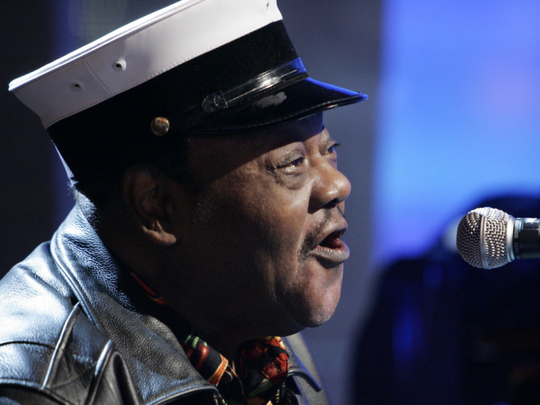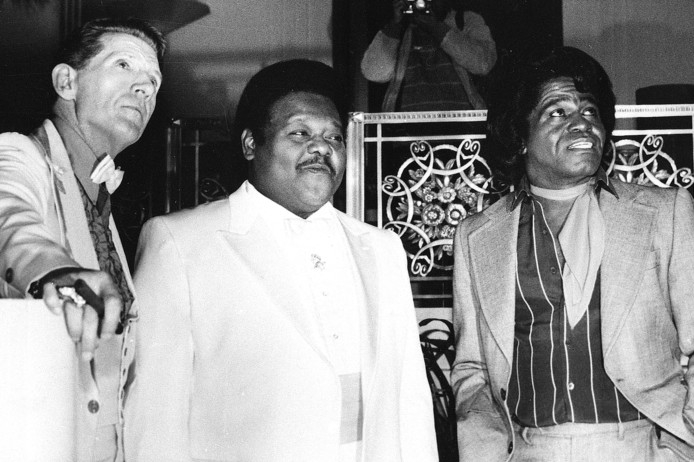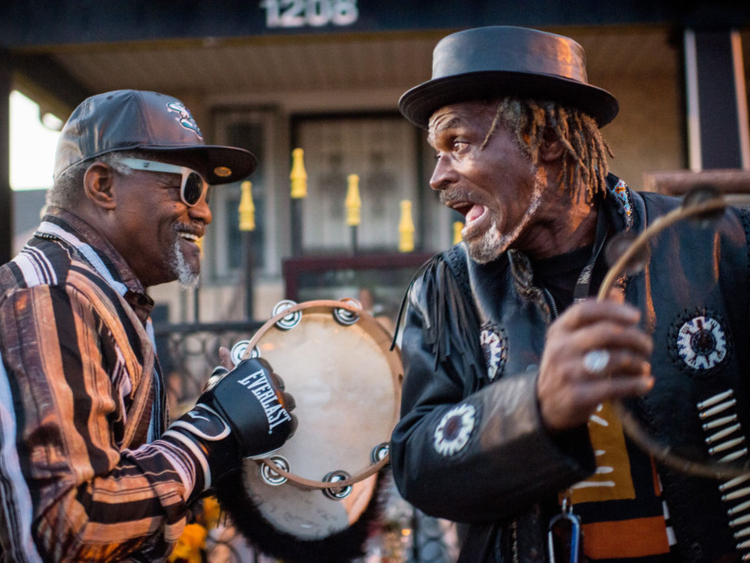
Fats Domino, the New Orleans rhythm-and-blues singer whose two-fisted boogie-woogie piano and nonchalant vocals, heard on dozens of hits, made him one of the biggest stars of the early rock ‘n’ roll era, died on Tuesday at his home in Harvey, Louisiana, across the Mississippi River from New Orleans. He was 89.
His death was confirmed by the Jefferson Parish coroner’s office.
Domino had more than three dozen Top 40 pop hits through the 1950s and early ’60s, among them Blueberry Hill, Ain’t It a Shame (also known as Ain’t That a Shame, which is the actual lyric), I’m Walkin’, Blue Monday and Walkin’ to New Orleans. Throughout, he displayed both the buoyant spirit of New Orleans, his hometown, and a droll resilience that reached listeners worldwide.
He sold 65 million singles in those years, with 23 gold records, making him second only to Elvis Presley as a commercial force. Presley acknowledged Domino as a predecessor.
WORDLESS WONDER
Rotund and standing 5 feet 5 inches — he would joke that he was as wide as he was tall — Domino had a big, infectious grin, a fondness for ornate, jewel-encrusted rings and an easy-going manner in performance; even in plaintive songs his voice had a smile in it. And he was a master of the wordless vocal, making hits out of songs full of “woo-woo”s and “la-la”s.
Working with songwriter, producer and arranger David Bartholomew, Domino and his band carried New Orleans parade rhythms into rock ‘n’ roll and put a local stamp on nearly everything they touched.
In 1947, Domino married Rosemary Hall, and they had eight children, Antoine III, Anatole, Andre, Antonio, Antoinette, Andrea, Anola and Adonica. His wife died in 2008.
In 1949, Bartholomew brought Lew Chudd, the owner of Imperial Records in Los Angeles, to the New Orleans’ club the Hideaway. Chudd signed Domino on the spot, with a contract, unusual for the time, that paid royalties rather than a one-time purchase of songs.
Immediately, Domino and Bartholomew wrote The Fat Man and recorded it with Bartholomew’s studio band. By 1951 it had sold a million copies.
Domino’s trademark triplets, picked up from It’s Midnight, a 1949 record by boogie-woogie pianist and singer Little Willie Littlefield, appeared on his next rhythm-and-blues hit, Every Night About This Time. The technique spread like wildfire, becoming a virtual requirement for rock ‘n’ roll ballads.
Domino performed in 1950s movies like Shake, Rattle and Rock, The Big Beat (for which he and Bartholomew wrote the title song) and The Girl Can’t Help It. In 1957, he toured for three months with Chuck Berry, Clyde McPhatter, the Moonglows and others.
Well into the early 1960s, Domino continued to reach both the pop and rhythm-and-blues charts with songs like Whole Lotta Lovin’, I’m Ready, I’m Gonna Be a Wheel Someday, Be My Guest, Walkin’ to New Orleans and My Girl Josephine.
MASS APPEAL
Domino’s appeal to white teenagers broadened as he embarked on national tours and appeared with mixed-race rock ‘n’ roll revues. Appearances on national television, on Steve Allen and Ed Sullivan’s shows, put him in millions of living rooms.
Domino had his biggest hit in 1956 with his version of Blueberry Hill, a song that had been recorded by Glenn Miller’s big band in 1940. It peaked at No 2 on the pop charts and sold a reported three million copies.
He followed with two more top five pop hits: Blue Monday and I’m Walkin’.
His life on the road ended in the early 1980s, when he decided that he did not want to leave New Orleans, saying it was the only place where he liked the food.
He went on to perform regularly at the New Orleans Jazz and Heritage Festival.
Reclusive and notoriously resistant to interview requests, Domino stayed home even when he received a lifetime achievement Grammy Award in 1987. (He did travel to New York when he was inducted into the Rock & Roll Hall of Fame in 1986 as one of its first members, although he did not take part in the jam session that concluded the ceremony.) In 1999, when he was awarded the National Medal of Arts, he sent his daughter Antoinette to the White House to pick up the prize.
He even refused to leave New Orleans when Hurricane Katrina devastated the city on August 29, 2005, remaining at his flooded home — he was living in the Lower Ninth Ward then — until he was rescued by helicopter September 1.
“I wasn’t too nervous,” about waiting to be saved, he told The New York Times in 2006.
He was often seen around New Orleans, emerging from his pink-roofed mansion driving a pink Cadillac.
In 1953, in Down Beat magazine, the Atlantic Records producer Jerry Wexler made a bold-sounding prediction that turned out to be, in retrospect, quite timid. “Can’t you envision a collector in 1993 discovering a Fats Domino record in a Salvation Army depot and rushing home to put it on the turntable?” he wrote. “We can. It’s good blues, it’s good jazz, and it’s the kind of good that never wears out.”














